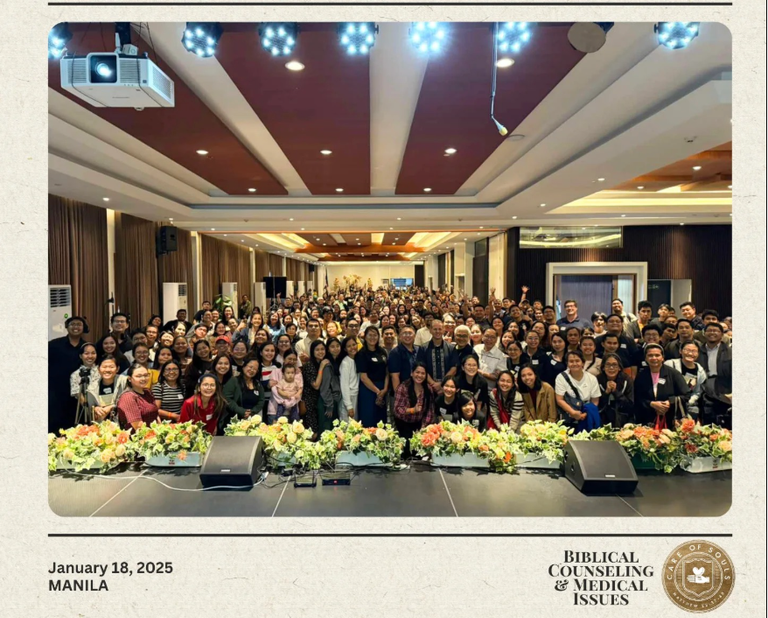Our school, PTS College & Advanced Studies, has been busy with the biblical counseling module for the past week. The professor is Dr. Adam Tyson, the senior pastor of Placerita Bible Church in Placerita, Santa Clarita, CA, USA.

After teaching biblical counseling & medical issues for five days, he also shared his expertise last Saturday at a conference at the Philippine Christian University in Malate, Manila.
Over six hundred participants joined the conference from all over the country. The event was also livestreamed, and there were 70 participants from Saudi Arabia, Florida, New York, and Canada.
Unlike last year's conference, the most challenging questions were medical. This time, I was expecting that similar questions would be raised during Q&A. Perhaps those questions have been answered already after a year. Examples of questions raised this time include practical steps to protect a biblical counselor from lawsuits, coping with sexual abuse in the past, and one question related to a celebrity. I forgot the other two questions.
The day's event has been divided into four sessions:
The Primacy of Dependence on the Bible in Biblical Counseling
Biblical Counseling and Psychology
Responding to Mental Health Issues
Counseling People with Depression
In the first session, Dr. Tyson unapologetically started with a discussion about the Bible. He firmly believes that effective counseling requires total dependence on the Bible. He reminded the audience about five basic beliefs concerning the role of the Bible in counseling. He affirms the classic belief about the divine origin of the Bible, its power to change people's lives, the need for accurate interpretation, the intent of the Bible to lead people to Jesus, and the internal testimony of the Bible to its validity.
During the second session, the speaker emphasized that psychology is opposed to the Bible. He argued his case based on seven arguments, such as the identification of the founders of psychology as self-proclaimed enemies of religion, the evolutionary worldview of psychology, the evasion of human responsibility in psychology, and the idea in psychology about the inadequacy of biblical responses such as prayer, dependence on the Holy Spirit, and the use of the Bible. Moreover, Dr. Tyson rejects the integration of psychology with Christianity, for there is nothing common between them when it comes to ultimate commitments. However, this does not mean that there is nothing to learn from psychology when it comes to observation or common sense, which Dr. Tyson describes as "common wisdom." Lastly, psychology does not direct people to Jesus, who is the Wonderful Counselor.
After laying down the basic foundations in the first two sessions, Dr. Tyson deals with three popular mental health issues. He gave us the process of how to diagnose and treat ADHD, bipolar disorder, and PTSD.
As for the last session, Dr. Tyson acknowledged the difficulty of defining depression. After clarifying the definition of the term, he shared both the medical model and the heart dynamics of depression, after which he concluded with practical steps on how to counsel someone with depression.
Checking the conference notebook, I found recommended resources on the last page. I found one very interesting, Feelings and Faith, the book authored by Brian Borgman. After browsing the content of the book, an idea came to me—to organize a book reading program and fellowship with the students.
Grace and peace!
Useful Links:
Association for Certified Biblical Counselors
Christian Counseling and Educational Foundation
Biblical Counseling Ministries Worldwide
PTS College & Advanced Studies
Posted Using INLEO
I think the Bible can help with depression cases, maybe with adhd cases but I got not enough knowledge there
Same here. These are new terms for me. What I like about biblical counseling is that it differentiates between the mind and the brain. In matters of the brain, that is for medical experts. When it comes to the mind, that's what a biblical counselor can address.
And mind can heavily influence whole body
Interestingly, the non-material part of man, which is the inner man (esothen) is described in the Bible in several ways:
soul or psuche
heart or kardia
mind or dianoia, phrases, and nous
spirit or pneuma
conscience or suneidesis, and
hidden person or kruptos
#cent #bbh
Congratulations @rzc24-nftbbg! You have completed the following achievement on the Hive blockchain And have been rewarded with New badge(s)
Your next target is to reach 75000 upvotes.
You can view your badges on your board and compare yourself to others in the Ranking
If you no longer want to receive notifications, reply to this comment with the word
STOP